The StopWatch girls & young women's research project newsletter 1: December 2022
Featuring in this first edition of our newsletter: about the project, what we've been up to over the past few months, reflections on misogyny in the police, and what's next
Welcome to the very first StopWatch girls & young women’s project newsletter!
About the project: an introduction from project leader, Shenna
I am Shenna Darcheville, and I am leading an amazing all-girl research team as we uncover the hidden stories of women’s encounters with the police across the UK. The project is a national research initiative, devised in response to girls and women reporting police encounters to be frightening, sexually degrading, and humiliating experiences. The recent high-profile cases such as the tragic murder of Sarah Everard and the shocking unlawful strip search of ‘Child Q’ have highlighted just how crucial this research is. Our aim is to learn more about these horrific types of experiences and use these findings as the foundations of a national campaign to improve policies and training around the policing of women, and to tackle misogyny in the police force and support and empower young women who have been victimised.
Everyone involved in this project is female: the research teams, the advisory board, the academics, training facilitators, and collaborators. Our motto is ‘Research About Us, By Us, For Us’. We believe that we as women are best placed to research and tell our own stories.
We currently have research teams in London, Manchester, Liverpool, and Nottingham – all young women between the ages of 16-40, who have been trained in research skills by Professor Louise Owusu-Kwarteng, director of undergraduate research at Greenwich University.
What have you missed?
We officially launched the start of our research at the House of Commons at an event hosted by our advisory board member Labour MP Bell Ribeiro-Addy. Since then, we have been on a mission to speak to as many girls and women as we can, to give them a voice and use their stories to create real change in the way that women are policed in the UK.
In September the team headed down to Tottenham to host our first in-person event supported by Sister System. Sister System allowed us to interview and take care of their remarkable group of girls for the day by pampering their nails and providing them with self-love workshops. We had the pleasure of teaching these girls their stop and search rights and hearing their stories that have contributed immensely to our research project.
This event was just incredible – thank you to our research lead Shenna for organising this for the team – and thank you to the girls from Sister Systems for sharing your stories with us, it was truly an honour and will make such a difference to our research. Thanks also to Kushty Beauty and Cycle Circle for ensuring everybody felt appreciated, loved, and cared for.
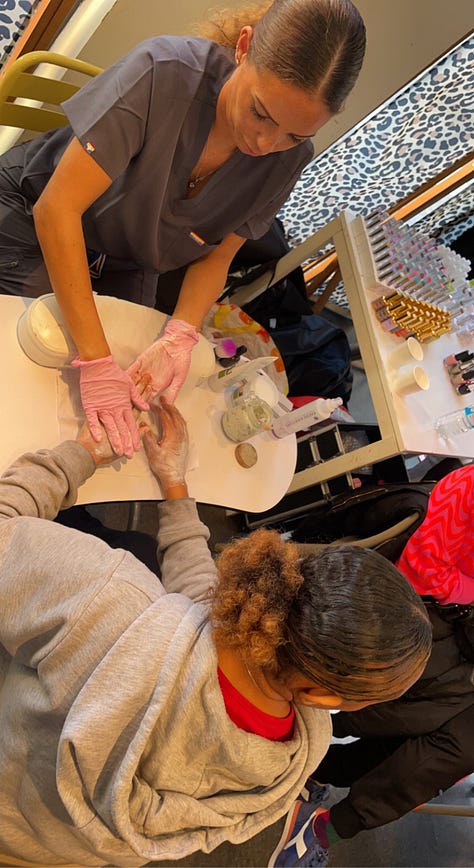
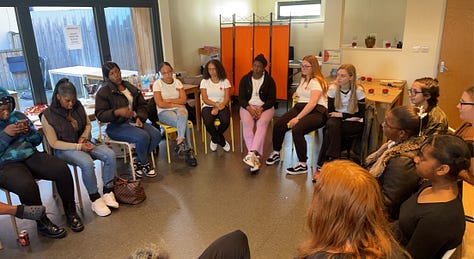
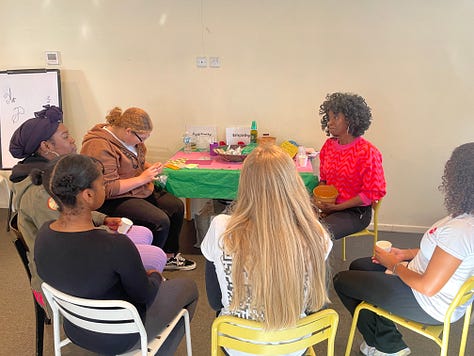
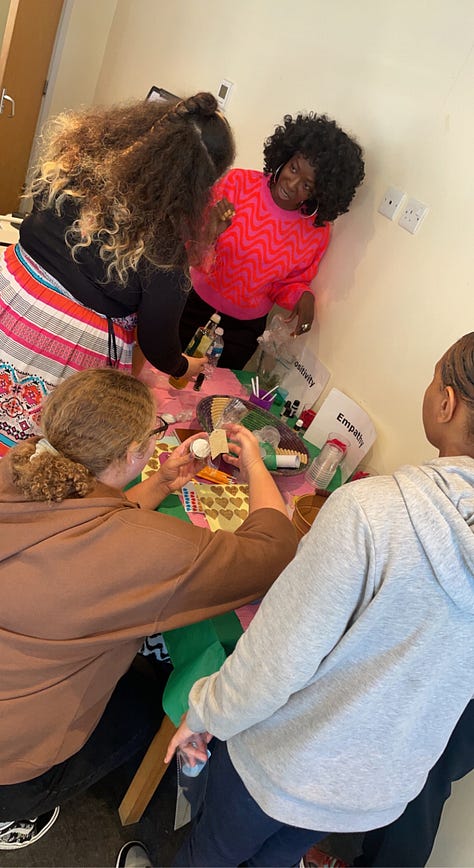
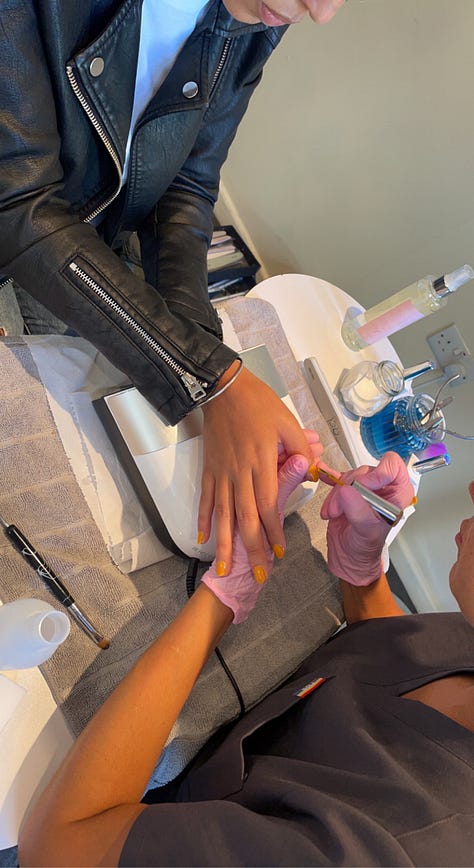
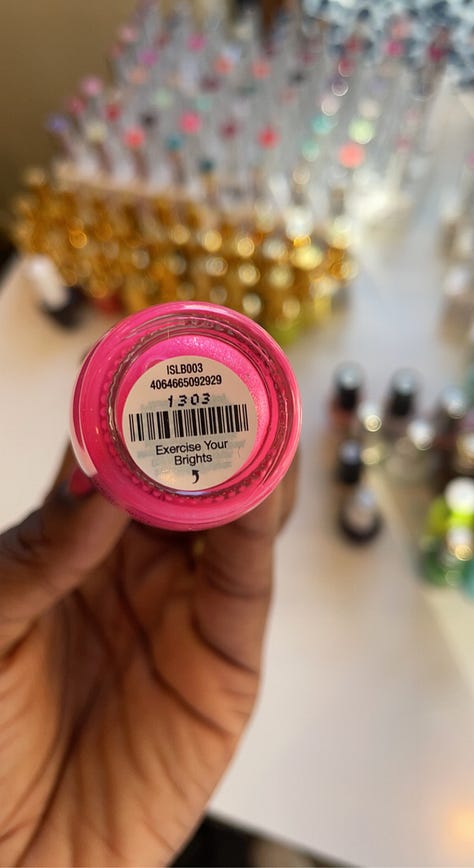
On Thursday 27th October, three of our girls – Sydney (senior co-researcher), Holly (StopWatch’s policy and research officer), and Sara (senior co-researcher) – visited the Houses of Parliament for a meeting with shadow minister for policing, Sarah Jones MP, to discuss misogyny in policing, violence against women, and youth justice. Some of the discussion involved sharing early findings from our research which was warmly welcomed by Sarah Jones. Everyone in the meeting concluded that there must be reform in policing in the UK that includes having more trauma-informed training from the start of their careers. What help are the police if they lack compassion in incidents where compassion, empathy, and understanding are needed the most?

Over the summer, the team have been busy with content creation: we’ve joined the growing world of podcasts! Now our podcast isn’t just any old talk show – we have been trained to use the best of effects, sounds and equipment that London has to offer, which is what makes our podcast so niche and effective. Plus, we’ve been given the opportunity to record first-hand stop and search experiences from women across the UK. Our series will include the latest updates on our research, what recent police mishaps against women have gone on in the news - all presented and debated by our fab research team in London. There is so much to unpick and reveal - click on the play button (below) to listen to episode one and stay tuned for episode two…
Recent police news: the HMICFRS inspection report
In the wake of the kidnap, rape, and murder of Sarah Everard in March 2021 by a serving Metropolitan police officer, the authorities commissioned four major reviews: an independent inquiry, to be led by Dame Eilish Angiolini, on Wayne Couzens’ policing career; a review of the Met’s culture and standards of behaviour by Baroness Casey; multiple investigations by the police watchdog, the IOPC; and fourthly, a thematic inspection of police vetting, counter-corruption, and misogyny by HMICFRS, the inspectorate of the constabulary.
The Casey review, which was published in October, described a misconduct system in desperate need of ‘radical and wholesale reform’, and outlined many cases of racist, sexist, and homophobic discrimination. The HMICFRS inspection report came out earlier this month, adding to the ever-expanding evidence base of rampant misogyny in British policing at every level. Inspectors found that misogynistic behaviour and attitudes are ‘prevalent in many – if not all – forces’ in England and Wales.
Read on for some of the report’s key findings:
For more than a decade, police forces have ‘consistently and repeatedly failed to implement recommendations’ from similar reports about misogyny in the police
Inspectors cited an unpublished report by Bournemouth University that found that ‘police officers involved in sexual misconduct in the workplace are statistically more likely to be the subject of intelligence reports from the public about their behaviour’ – but despite this, many forces ‘have failed to consider the link between misogynistic behaviour towards colleagues and similar behaviour towards members of the public’
A significant proportion of survey respondents (police officers and staff) believed that misogynistic behaviour in the police hadn’t changed at all in the last five years – or had got worse
Women in the police force described instances of senior male officers pursuing junior colleagues for sex, male officers viewing pornography at work and sending it to female colleagues’ phones, inappropriate sexual comments being made towards women, male officers pestering female staff for sex at work social events, and officers and supervisors making sexually explicit comments about members of the public – much of this behaviour ‘hadn’t been taken seriously or hadn’t been thoroughly investigated’
Male officers were found to be engaging in ‘booty patrol’: stopping women in public for no reason other than officers regarded them as attractive
There was a serious stigma around pregnancy and part-time working within policing,
Sexist behaviour and attitudes also came from supervisory ranks – leading to it going unchallenged and becoming accepted and normalised
Women in policing were found to feel less confident than their male colleagues in reporting prejudicial and improper behaviour at work
Only 28% of women and 35% of men in the police who reported prejudicial and improper behaviour were satisfied with the outcome
Women in the police told inspectors that many forces were simply paying lip service to wanting to change the culture of misogyny and discrimination
Monthly misogyny musings
Every month the StopWatch girls’ team investigates what has been published in the media in relation to our research. The story we’d like to highlight this month is that of former MPS officer Marvin Turner. In November, we came upon an article from The Independent that stated:
A detective sergeant has been fired from the Metropolitan Police after he was accused of sexually harassing and touching a junior staff member during a night shift. Marvin Turner was dismissed without notice and his actions branded thoroughly reprehensible following a professional standards investigation, Scotland Yard said on Thursday.
Like many police officers, Turner abused his power and took advantage of his position. He was later fired from his job but, according to the article, faced no criminal repercussions:
The matter was also investigated criminally, but it was determined that the case did not meet the threshold for a referral to the Crown Prosecution Service.
As this case demonstrates, there is an urgent need for stronger and more effective mechanisms for holding the police to account. Yes, we are glad he has been fired, but what about justice for the victim, and why this kind of behaviour is so common within Britain’s police forces?
Our aim with this research is to bring forth real change – not just change on the surface, and to amplify the voices of those who have been subject to abuse and harassment at the hands of the police.
What’s coming up?
If you’ve made it this far, here’s what’s coming up for StopWatch girls and young women’s project…
London
This month, we delve into recording our second podcast of the series, and we celebrate the release of our first episode.
Liverpool
The Liverpool research team have now completed their training and are ready to start interviewing women and girls – we are sending a big congratulations your way up north! The Nottingham team are halfway through their training which is phenomenal, we cannot wait to collate more crucial data from across the UK.
Manchester
In January, our team is finally joining forces with the Manchester team! We will be holding a self-care and story sharing workshop to speak to women and girls about their encounters with the police. This event will be held at Friends’ Meeting House in central Manchester (6 Mount Street, M2 5NS – a 15-minute walk from Piccadilly train station) on Tuesday January 24th. A networking event for women’s organisations with an interest in policing and criminal justice will follow. Please email Shenna@stop-watch.org for information on how to get involved!
And that’s it for this month – thanks for reading!
StopWatch is a volunteer led organisation that relies on the generosity of trusts and grant funders to operate. We DO NOT accept funding from the government or police as we believe this would compromise our ability to critically challenge.
We’d appreciate any one-off or regular donations to help support our work. You can click on our donate button below to go through to our donation page.







